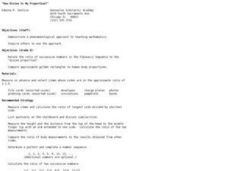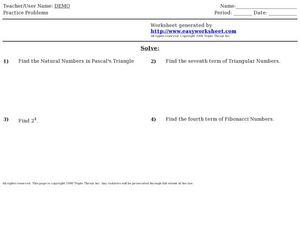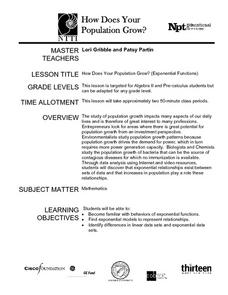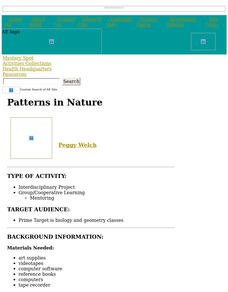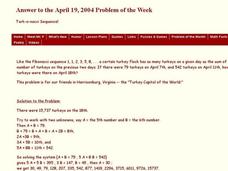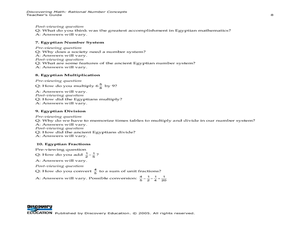Curated OER
Fibonacci I
Fifth graders have the opportunity to gather information themselves on Fibonacci and on the occurrence of Fibonacci numbers in nature. They divide up into groups of 2 to 4 to research.
Teach Engineering
Discovering Phi: The Golden Ratio
Fe, phi, fo, fum. This activity leads pairs to find the ratio of consecutive terms of the Fibonacci sequence. The pairs find that the Fibonacci sequence can be found in many places. A discussion with the class shows that the ratios found...
Willow Tree
Fibonacci and Other Sequences
Fibonacci is an interesting sequence that forms some unique patterns. Learners explore sequences that do not have the typical arithmetic and geometric patterns. They identify the pattern and find the next consecutive terms....
Curated OER
Patterns and Algebra - Modeling
Seventh grade math is so much fun! They solve 10 different problems that include using patterns to complete a table, describe the pattern, and identify the specific term in the pattern for each. Then they give a description of the...
Curated OER
Applied Science - Science and Math Pre Lab
Students find Fibonacci sequences. In this applied Science lesson, students solve Fibonacci sequence problems. Students explore the mathematical patterns of objects in nature.
Curated OER
Spiral Patterns in Art
In this art worksheet, students view a picture of Alexander Calder's sculpture "Black, White, and Ten Red." They analyze the sculpture by first finding the "rule" in the Fibonacci sequence. Students read a paragraph about where the...
Curated OER
Math in Nature
Students explore math in nature. In this instructional activity on the Fibonacci sequence, students use natural objects and Fibonacci numbers to discover mathematical patterns.
Curated OER
Sequences, Counting and Probability - Week 4
In this sequence worksheet, students complete problems involving geometric sequences. They identify the nth term in a sequence. Students explore various positions in the Fibonacci sequence. This two-page worksheet contains eight...
Curated OER
"How Divine Is My Proportion?"
Eighth graders explore the concept of the divine proportion/golden ratio. In this Fibonacci Sequence exploratory lesson, 8th graders measure the length and width of various objects to see which items have a divine proportion. Students...
Curated OER
Patterns Across Cultures: The Fibonacci Sequence in Visual Art
Students study the origin of the Fibonacci Sequence. In this investigative instructional activity students identify works of art where Golden Spiral or Ratio appear.
Curated OER
Easy Worksheet: Special Numbers
In this special numbers worksheet, students solve 4 short answer problems. Students find various terms in the Fibonacci sequence, triangular number sequence, and the natural numbers in Pascal's Triangle.
Curated OER
Numbers in Nature
Students identify numbers in nature. For this algebra lesson, students solve problems using Fibonacci sequence as it is expressed in nature. They research the Fibonacci's pattern as it relates to numbers.
Curated OER
Early Greek Science and Philosophy
There are fundamental principles that nearly everybody knows about. Define the principles of Golden Mean, Fibonacci Numbers, creativity, and matter in terms of their Greek origins. Presented here are brief histories, philosophies, and...
Curated OER
How Does Your Population Grown?
Do you know how the population has grown of your community? Can you predict the population over the next half century? Can we find an algebraic model that matches our data? These along with many more questions can be researched by...
Curated OER
The Fibonacci Keyboard- Jazz and Math
Students demonstrate an understanding of the relationships of the Fibonacci Sequence. They apply the Fibonacci Sequence and find its relationship to a piano keyboard. They explore various relationships between music and the Fibonacci...
Curated OER
Fibonacci Trick
In this algebra worksheet, students solve a puzzle starting with two single digit numbers and eventually conclude that the answer can be used with Fibonacci's pattern. There are 11 steps to the puzzle with a provided answer.
Curated OER
Class of Gold
How can you see a number in nature? Here, learners discover both Fibonacci numbers and the golden ratio by exploring a number of different resources. Note: Some of the resources are older and may be missing some of the links, but the...
Curated OER
Patterns in Nature
Research patterns in nature which illustrate biological and mathematical concepts. Your class will discover and explore aspects of fractals, Fibonaccis numbers, whale and butterfly migration patterns, whale identification, flower...
Curated OER
Turk-o-nacci Sequence
In this sequence worksheet, students use the Fibonacci sequence to determine the number of turkeys in a flock. This one-page worksheet contains 1 multi-step problem. The answer is provided at the bottom of the page.
Curated OER
Representing Patterns & Evaluating Expressions
Write algebraic expressions, determine patterns, and evaluate expressions in a real-world context. Learners engage in a series of collaborative activities to identify, model, and give variables for real-world patterns. They write...
Curated OER
Amazing Fibonacci
Students integrate the patterns of Fibonacci into music. In this geometry lesson plan, students apply the concepts of recursion, pattern and Phi or Golden Ratio to composing and playing music on various instruments. They lesson plan is...
Curated OER
Discovering Math: Rational Number Concepts
Students explore the concept of Egyptian contributions in mathematics. In this Egyptian contribution lesson, students research Egyptian hieroglyphics and pyramids. Students write numerals in hieroglyphics. Students use Egyptian methods...
Curated OER
Six Number Pattern and Sequence Activities
In this numbers and sequences worksheet, students solve problems presented in six different activities. Extension problems are also provided.
Curated OER
Difference of Equations
For this difference of equations worksheet, students solve and complete 49 various types of problems. First, they obtain the solution of any linear homogeneous second order difference equation. Then, students apply the method of solution...










